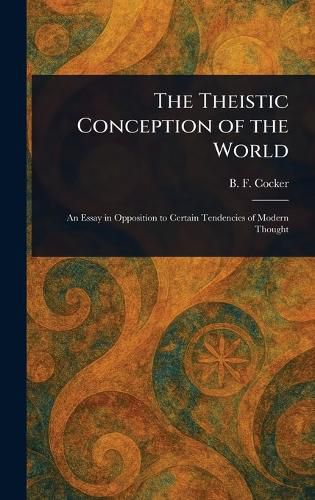Readings Newsletter
Become a Readings Member to make your shopping experience even easier.
Sign in or sign up for free!
You’re not far away from qualifying for FREE standard shipping within Australia
You’ve qualified for FREE standard shipping within Australia
The cart is loading…






This title is printed to order. This book may have been self-published. If so, we cannot guarantee the quality of the content. In the main most books will have gone through the editing process however some may not. We therefore suggest that you be aware of this before ordering this book. If in doubt check either the author or publisher’s details as we are unable to accept any returns unless they are faulty. Please contact us if you have any questions.
"Theistic Conception of the World: An Essay in Opposition to Certain Tendencies of Modern Thought" by Benjamin Franklin Cocker delves into the philosophical underpinnings of theism, offering a robust defense of theistic principles in the face of evolving modern thought. This influential work explores the relationship between religion and science, providing a comprehensive examination of theistic conception. Cocker meticulously investigates the core tenets of theism, engaging with prevailing philosophical arguments of his time. This republication offers readers the opportunity to engage with a significant contribution to the fields of religion, philosophy, and the ongoing dialogue surrounding theism. Explore the enduring questions of faith, reason, and the very nature of existence within the pages of this classic exploration. A timeless resource for anyone interested in philosophy, religion, and the history of ideas.
This work has been selected by scholars as being culturally important, and is part of the knowledge base of civilization as we know it.
This work is in the public domain in the United States of America, and possibly other nations. Within the United States, you may freely copy and distribute this work, as no entity (individual or corporate) has a copyright on the body of the work.
Scholars believe, and we concur, that this work is important enough to be preserved, reproduced, and made generally available to the public. We appreciate your support of the preservation process, and thank you for being an important part of keeping this knowledge alive and relevant.
$9.00 standard shipping within Australia
FREE standard shipping within Australia for orders over $100.00
Express & International shipping calculated at checkout
This title is printed to order. This book may have been self-published. If so, we cannot guarantee the quality of the content. In the main most books will have gone through the editing process however some may not. We therefore suggest that you be aware of this before ordering this book. If in doubt check either the author or publisher’s details as we are unable to accept any returns unless they are faulty. Please contact us if you have any questions.
"Theistic Conception of the World: An Essay in Opposition to Certain Tendencies of Modern Thought" by Benjamin Franklin Cocker delves into the philosophical underpinnings of theism, offering a robust defense of theistic principles in the face of evolving modern thought. This influential work explores the relationship between religion and science, providing a comprehensive examination of theistic conception. Cocker meticulously investigates the core tenets of theism, engaging with prevailing philosophical arguments of his time. This republication offers readers the opportunity to engage with a significant contribution to the fields of religion, philosophy, and the ongoing dialogue surrounding theism. Explore the enduring questions of faith, reason, and the very nature of existence within the pages of this classic exploration. A timeless resource for anyone interested in philosophy, religion, and the history of ideas.
This work has been selected by scholars as being culturally important, and is part of the knowledge base of civilization as we know it.
This work is in the public domain in the United States of America, and possibly other nations. Within the United States, you may freely copy and distribute this work, as no entity (individual or corporate) has a copyright on the body of the work.
Scholars believe, and we concur, that this work is important enough to be preserved, reproduced, and made generally available to the public. We appreciate your support of the preservation process, and thank you for being an important part of keeping this knowledge alive and relevant.